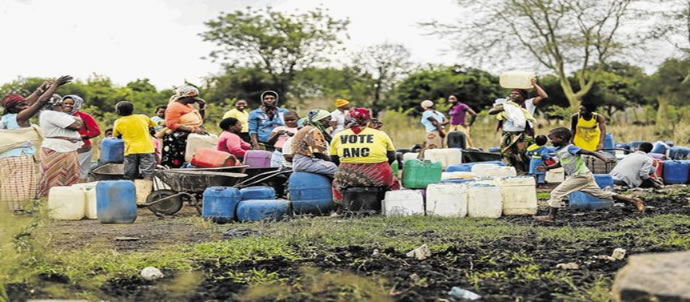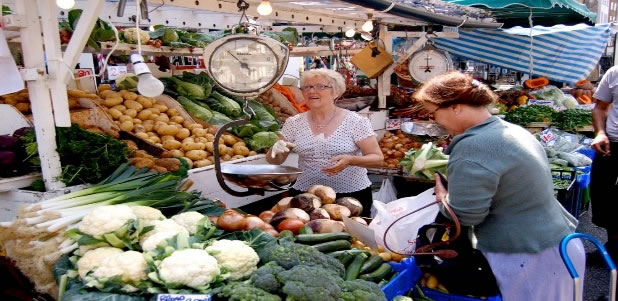Why the failing farm syndrome?
What prevents emerging farmers from achieving sustainability?
Why do the Mala Mala’s, the Manyeleti’s and countless other communities struggle to find sustainability?
 |
 |
The community at Mala Mala who continue to languish notwithstanding their grant of land. Why do they not receive any real benefit from their rental income, a substantial monthly sum.
|
Why does the community not produce foodstuff for their many neighbours, arguably some of the most high end tourist resorts in the world, who are in turn forced due to a lack of local supply, to “import” in the main their requirements from the Johannesburg market? |
Why is the land claim at Manyeleti still not settled, after some 13 years? Why does listlessness and hopelessness prevail?
On the other hand, and by the application of appropriate skills, land reform can become a realizable objective, indeed, an attractive and sustainable business opportunity.
From a demand side, and writing in its Agricultural Outlook for 2015, ABSA sums up the position as follows:
“… the consumption of food to sustain life in the next 36 years till 2050 is expected to exceed the consumption of food over the past 500 years. This is mainly due to an expected population increase of over 2 billion in mainly Africa and Asia, while the demand for food in Europe is expected to decline.”
Why the disconnect?
The Resolutions Board
The prime difficulty to the implementation of the land reform policy is currently the absence of a central repository of intellectual capital comprising financial, agri-engineering and legal expertise to which stakeholders and role players in all sectors can readily turn, and from whom they can receive holistic guidance and advice.
Put another way, whilst communities, commercial operators and other stakeholders indeed require for example legal advice, no single factor of advice is the answer.
The Resolutions Board comprises such a body of appropriate specialists grouped together to implement land reform in South Africa, and more particularly tackle the concerns and indeed opportunities expressed above.
We have also consulted widely and at all levels including with representatives of the public and private sectors, the community and NGO sectors, the funding sector and the market and academic sectors. In turn, we have encapsulated our findings into substantial reports which deal also with issues as to production and market structures, profitability, food security and the like.
The upshot of our research is as follows:
-
whilst some are negative, the Land Reform policy is arguably one of the most important and progressive pieces of legislation ever enacted in South Africa; and
-
insofar as negativity is concerned, this arises in the main from the use of the phrase “land reform”, in fact a misnomer for what should be phrased or interpreted as “community reform”, “community development” or “the commercialization of land”.
Analysis of the supply chain.
Whilst farmers participate in the municipal markets, a price takers market, the real value lies in the consequential markets namely the beneficiation, distribution and retail markets, or secondary markets, being markets far larger than the underlying production market and being a market in which the farmer does not participate.
In our view, the appropriate community response to the land reform policy is not as such a legal response, but rather and more particularly, an economic response. Armed with the policy, we are now able to “unlock value”. We can unbundle market concentrations, reposition farmers in the supply chain and in turn give farmers direct access to the end user. Under-utilized land, and there is more than sufficient of it, is the target. Expropriating viable farm land is not the target. Indeed, adopting the latter approach is simply “not economic”!
We show how this is possible!
 |
A world wide trend, farmers are “taking back” the chain of supply. Weekend markets are moving to permanent markets, a move referred to increasingly around the world as the “farm to plate” movement. The central issue is that the farmer now becomes the shareholder and supplier of the outlet, an approach which in turn enables him or her to access the consumer at a consumer price, be it at the wholesale or retail level. It is this model that we are following by establishing a pilot Cape Farmers Market in Stellenbosch. |
Repository of skills and intellectual capital.
Common to all communities in South Africa is a desire to commercialise. To do so, communities need ready access to a central repository of:
- financial advice;
- agri-engineering advice; and
- legal advice.
This is where recourse is to be had to the Resolutions Board.
What is further apparent from our on-going research is that whilst substantial monies are available for purposes of implementation of the reform policy, funders are becoming more and more loathe to expend monies, even grant monies, and in our view will now not do so in the absence of a business plan prepared and drawn up by appropriate specialists in the fields of centrally finance, agri-engineering and law.
Profile of role players
To give effect to the Land Reform Policy, we orchestrate and combine the roles, and in effect “market offerings and requirements” of each the following stake holders namely:
- the private sector;
- the public sector;
- the community sector;
- the NGO sector;
- the funder or financial sector; and
- the consumer and or market sector.
By approaching the issue of land reform, as set out briefly herein, the failing farm syndrome i.e. Manyeleti and or Mala Mala and others, will be addressed and indeed avoided. Similarly, food security will be enhanced as will community productivity and profitability. The hopelessness and listlessness that currently prevails in many areas too will be addressed.
To this end we are always looking to expand our ranks at The Resolutions Board with appropriate and willing professionals keen to see land reform in South Africa “now happen”. Your comments, input and indeed participation will accordingly be appreciated.
Further discussions
For further discussions and assistance please contact me directly, or one of our members listed below.
Duncan Okes
082 775 0204
www.duncanokes.co.za
Contacts
|
|
DUNCAN OKES INC. |
EES – Siyakha Equity Pro |
Hennie van der Merwe |
Glynn Williams / Fiona Bester / Lene Macnab |
Duncan Okes |
Tel: 011 – 726 3040 |
Malachite Media Services
|
|
BRANDSWELL RADIO AND GM RADIO SOLUTIONS |
|
Gerhard De Beer |
Dr Daan Low |
Gavin Meiring |
|
